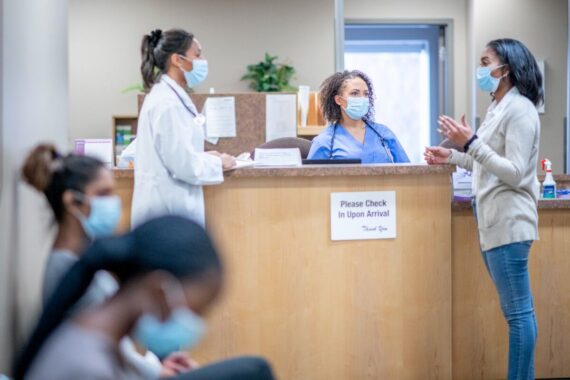An analysis by NHS England has found that 16% of GP appointments are ‘potentially avoidable’.
During an online webinar for GP practices on Thursday last week, NHS England officials explained ‘the benefits of the modern general practice model’, including stats from its ELITE Programme, an internal NHS study which used data to identify avoidable GP appointments.
It analysed 56,900 appointments and an average of 2.5% of GP appointments were released, with 3.1% of nursing time also identified as ‘avoidable’ and released, NHS England said.
Dr Minal Bakhai, national clinical lead for Digital First Primary Care at NHS England and NHS Improvement, said that practices implementing modern general practice ‘have seen reduced avoidable appointments’.
The Modern General Practice Access model, set out in the recovery plan earlier this year, comprises a move to digital telephony, making online requests ‘simpler’ and offering ‘faster’ navigation, assessment and responses for patients.
This has been developed to meet the Government’s ambitions of ‘tackling the 8am rush and making it easier and quicker for patients to get the help they need’.
Dr Bakhai, who is a GP working in London, said: ‘Practices have seen many benefits on implementing elements of modern general practice. They have seen reduced avoidable appointments, released GP and administrative time, which can help reduce the spill over of work into our free time.
‘Work carried out by the South East region in the initial phase looking at reducing avoidable appointments showed that 2.5% of GP appointments were saved, with the potential to reduce 6%.
‘Redistribution of work, with over 450,000 referrals made to community pharmacy with only 6% needing to be referred back to general practice.’
Dr Bakhai said there was also improved continuity of care resulting in an estimated 5.2% reduction in consultation numbers.
She added: ‘And patient experience scores are 6 percentage points higher than the national average in practices that have been implementing modern general practice.’
Results from NHS cloud-based telephony pilots with 122 practices serving 1.1 million patients also found that 90% ‘would recommend the change’, while 60% agreed that the number of complaints received about not getting through to the practice ‘have reduced’, and 70% ‘agreed it made it easier to manage their workload’.
The Government is on track to move all GP practices from analogue to digital telephony by March next year, according to its latest progress update on the recovery plan.
However, last month, NHS England’s primary care director Dr Amanda Doyle told Pulse that having a new telephone system ‘is not the answer on its own’, and that it must be combined with other digital tools to improve patient experience.
Earlier this year, a Pulse survey found almost half of GPs who have already implemented ‘modern’ access measures prescribed by the general practice recovery plan say that it has not helped improve access.
Stats set out in NHS England’s GP webinar
- Opportunity identified with 16% of appointments being potentially avoidable
- In the first phase they have managed to release on average 2.5% of GP appointments and 3.1% of nursing time were identified as avoidable and released
- Referral to pharmacy: April 2022 – February 2023, 450,192 GP CPCS referrals were completed
- 4,534 practices have made at least one completed referral
- Only 6% of referrals escalated back to general practice
- Estimated 5.2% reduction on consultation numbers
- 72% of patients contact in ‘digital first practices’ studied was started online
- Patients preference for a face-to-face consultation was 12%
- Practice resolved requests by phone (50%), by message (38%), 15% face to face
- Patient satisfaction is 6 percentage points higher than national average
- 90% would recommend the change to cloud based telephony
- 60% agreed that the number of complaints (about getting through) have reduced
- 70% agreed it made it easier to manage their workload
Source: NHS England
Pulse October survey
Take our July 2025 survey to potentially win £1.000 worth of tokens














2.5% redirected
For an 8 session GP, that might be 3 appointments per week
How many clinician sessions spent doing “digital triage” to deliver that?
is triage first beneficial and efficient when 84 % of GP consultations are appropriate ? Surely it is only efficient when you can triage/complete over 50% of appointments and that assumes triaging double the amount of people .
Problem is there is no data on long term safety of only seeing 15% of patients in person. 15% sounds incredibly low to me. When things are missed patients will direct complaints to practice who have managed remotely instead of making a proper assessment and examination. Also I wonder about the effect on clinicians on sitting and looking at digital triage requests or conducting remote consultations all day. Soul destroying.
90% of eConsults are utterly inane. No wonder 650,000 were “referred to community pharmacy.”
Wouldn’t it make more sense for the patient to walk down there for their 2 hours of mild headache, rather than composing 8 page survey of every bodily symptom with at least 4 incorrect but red flag responses to be seized on by ambulance chasers in the future. After all, anything could be cancer
Agreed, the Tsunami of trivia invited through econsult is not representative of need nor does it reflect the case mix we were seeing before ‘modern, digital, transformative’ practice. And makes us the patsies for litigation for stuff that will be missed, all because of a lack of a central secure workforce plan.
No wonder. Patient booked in with me having seen 2 noctors who pretended to deal with the problem by shirking it to someone else.
I honestly believe we will all become salaried practitioners and noctors will be upgraded to something similar. Time to get a private health insurance.